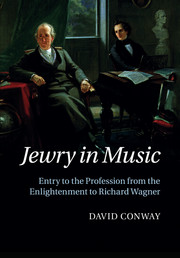2 - Eppes rores: can a Jew be an artist?
Published online by Cambridge University Press: 05 January 2012
Summary
Eppes rores
I want to present to you … my best pupil … [He’s] a fine young lad, merry and obedient. Actually, he’s a jewboy [Judensohn], but no Jew. By way of real sacrifice the father didn’t have his sons snipped and is bringing them up on the right lines; it would really be eppes rores [= etwas Rares (something rare), in imitation of Yiddish] if for once a jewboy became an artist.
Thus the twelve-year-old Felix Mendelssohn’s music tutor, the director of the Berlin Singakademie Karl Friedrich Zelter, writing to his friend Goethe in October 1821. Zelter has been accused of ‘poor taste indeed’ in his comments, on the grounds that he was at the time receiving comfortable fees from his pupil’s father and was received by the family as a friend. But the context makes it perfectly clear that, with his own little Jüdeln, he was in his elephantine way writing humorously to Goethe, to whom he was a bosom friend as well as a trusted adviser on music. Whilst his phrases and attitude (perhaps owing something to his earlier parallel career as a stonemason) jar to a politically correct age, Zelter was simply expressing a bemusement that would have been common amongst the artistic elite of his time at a new phenomenon, and indeed a delight at his association with it. Goethe himself had given a sharp and patronising opinion, some fifty years earlier in 1772, of the Poems of a Polish Jew published in German by one Issachar Falkensohn Behr: ‘It is extremely praiseworthy for a Polish Jew to give up business in order to learn German, to polish verses and devote himself to the Muses. But if he can do no more than a Christian étudiant en belles lettres, then he does wrong, we think, to make such a fuss about being a Jew.’ Behr, clearly, fell a long way short of being an artist; his anodyne outpourings were simply derivative. Here in fact we have an early (and exactly comparable) instance of the ‘Morton’s fork’ evaluation of Jews in the arts, which was eighty years later to be couched in its most explicit form by Wagner – either such Jews were academic imitators, like Mendelssohn, or, if they were innovative and successful, like Meyerbeer, they were only in it for the money. Nor should Goethe’s assumption that a Jew must inevitably be ‘in business’ be overlooked – in fact in this case he was not far from the mark; Behr seems to have taken to academic life because his trade goods had been stolen in Königsberg and he had nothing better to do than to inscribe himself at the University.
- Type
- Chapter
- Information
- Jewry in MusicEntry to the Profession from the Enlightenment to Richard Wagner, pp. 15 - 54Publisher: Cambridge University PressPrint publication year: 2011



